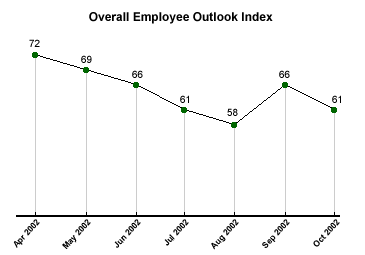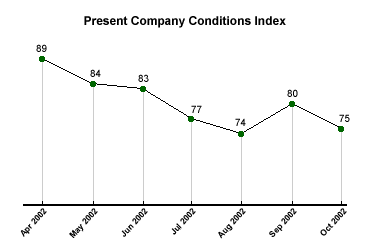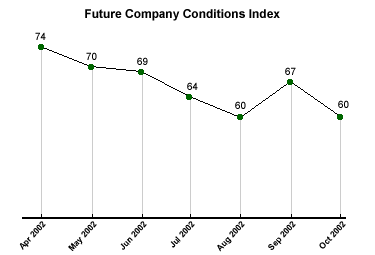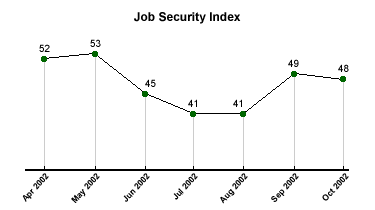Employee confidence declined in October*, according to the Employee Outlook Index -- a joint effort of UBS and The Gallup Organization. The Index fell five points from 66 in September to its current level of 61. This puts employee confidence back at its July level (61) and modestly above its August low of 58. The Employee Outlook Index is now 11 points below its April benchmark -- and high point -- of 72.

Present Company Conditions Decline
All three dimensions of the Employee Outlook Index declined in October. The Present Company Conditions Index fell five points from 80 in September to 75 in October. This dimension of the Index, which measures employee perceptions of how their companies are currently doing in the marketplace, is back near its August low of 74 and 14 points below its April high of 89.

Future Company Conditions Decline
Employee ratings of their companies' current business conditions not only returned to the low point they hit in August, but so did their ratings of the prospects for their companies over the next six months. The Future Company Conditions Index fell to 60 in October, down seven points from September (67) and back to its August low of 60. Like the Present Company Conditions Index, this dimension is down 14 points from its April high of 74.

Job Security Index Drops Slightly
The Job Security Index tends to lag the trend of the overall Employee Outlook Index. It declined only slightly from 50 in September to its current level of 48. Although this places the Job Security Index five points below its May high of 53, it remains seven points above its July and August lows of 41.

Implications
The history-making Republican successes in the midterm elections are rightly being attributed to the fact that national security issues -- the war on terrorism and homeland defense -- trumped the economy in the eyes of most American voters. As a result, it is not surprising that the administration has placed these issues at the top of its agenda for the next several months. Nor is it surprising that Congress will focus on terrorism and defense when it returns for a brief session later this month.
Unfortunately, this leaves it to the Fed to stimulate the economy. Given this context, it is a good thing that the Fed decided to reduce interest rates by a somewhat surprising 50 basis points last week. On the other hand, the Fed cannot get the economy back on track by itself, and it looks like a fiscal-policy stimulus will have to wait until some time after the new Congress gets going next year.
As a result, the next several months are going to be difficult for many companies. In such an environment, employee confidence may continue its downward trend -- thus it is essential that companies over-communicate about their financial situation with their employees.
*Results are based on telephone interviews with 685 adults who are employed with non-governmental, for-profit companies having five or more employees, aged 18 and older, conducted Oct. 14-17, 2002, and Oct. 21-22, 2002. For results based on the total sample, one can say with 95% confidence that the maximum margin of sampling error is ±4%.

